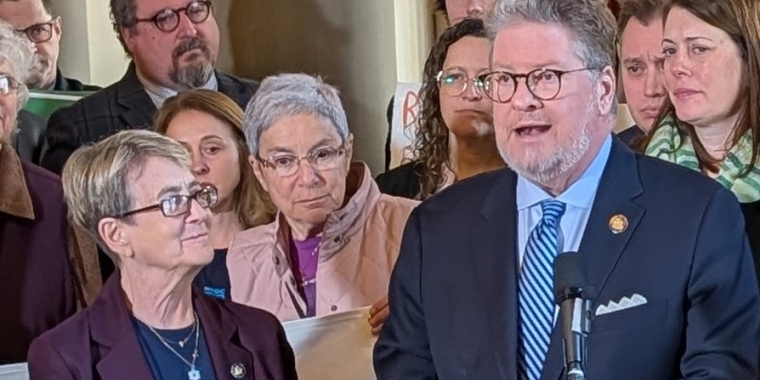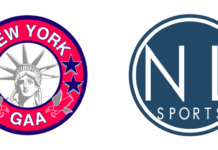
Assemblymember Glick and Senator Harckham at the PRRIA press conference in March 2025
By Dan Murphy
We are drowning in garbage. Previous solutions like landfills and incinerators are insufficient and awful for public and environmental health. We need to get smarter about how we deal with our packaging & plastic waste. This bill promotes innovation & saves taxpayers over $1B.
Local governments in New York could save $1.3 billion over 10 years if state lawmakers force big businesses to reduce the amount of plastic they use to package food and other products, according to a report by the environmental group Beyond Plastics.
In the eight Hudson Valley counties that include Rockland and Westchester, the savings would exceed $100 million, largely by reducing what local governments spend to truck and dispose of plastic waste in incinerators and landfills, a tab that falls to taxpayers, the report says.
- In New York, plastic accounts for about 14% of the 18 million tons of waste that ends up in landfills and incinerators, according to state figures.
- A measure in Albany would force companies that do at least $5 million in business in New York to reduce by 30% the amount of plastic they use in their packaging over 12 years.
- Opponents have dubbed the bill, sponsored in the Assembly by Democrat Deborah Glick, as the “Cheese Ban Bill,” claiming it will cost consumers more to buy a single slice of cheese wrapped in plastic
State Sen. Pete Harckham, the chair of the senate’s environmental conservation committee, said the report is the first to highlight the financial implications of continuing to wrap products in plastic.
Less than 6% of plastic gets recycled, while the rest ends up in landfills and incinerators. In New York, plastic accounts for about 14% of the 18 million tons of waste that ends up in landfills and incinerators, according to state figures.
Harckham’s bill – the Packaging Reduction and Recycling Infrastructure Act – passed the Senate last year but failed to make it to an Assembly vote on the last day of the 2024 session. It’s been reintroduced this year.
The measure would force companies that do at least $5 million in business in New York to reduce by 30% the amount of plastic they use in their packaging over 12 years. And all forms of packaging – glass, cardboard, paper, metal and plastic – would have to be recycled at a rate of 75% by 2052. There will be about 3.8 million tons of packaging waste generated this year, equal in weight to 10 Empire State Buildings, the report notes.
“State legislators have a choice,” said Judith Enck, Beyond Plastic’s president. “Do they let this crisis worsen or do they take action this legislative session?”
High recycling costs have led to increased taxes and recycling limitations; in addition, the New York State Department of Environmental Conservation (DEC) notes that the state’s 25 municipal solid waste landfills could be full within 15 years.
Judith Enck, former EPA Regional Administrator and president of Beyond Plastics, said, “Passage of this transformational plastics reduction bill will protect people’s health and the environment and save tax dollars. There was massive opposition by the plastics, chemical and fossil fuel industries, which was overcome by significant public support for the bill. Immense thanks to Senate Majority Leader Andrea Stewart Cousins and bill sponsor Senator Pete Harckham for passing this bill which will reduce plastic pollution in the Hudson River, the Bronx River, Long Island Sound and other cherished water bodies.”
Adrienne Esposito, executive director of Citizens Campaign for the Environment (CCE), said, “This is a tremendous victory and a game-changer in the effort to combat our state’s solid waste crisis. Finally, corporations will have to take out their own trash! Each year companies ship billions of items with excess packaging, exacerbating the solid waste crisis, yet they took no responsibility for managing the waste they create, until now. Municipalities and taxpayers will no longer have to solely shoulder the financial burden of paying for packaging waste and unrecyclable materials. Once signed into law, the Packaging Reduction and Recycling Infrastructure Act will reduce the amount of packaging manufacturers use and make the packaging easier to recycle and less toxic. This bill will increase recycling rates and save local governments and taxpayers millions of dollars each year. We literally could not afford to wait any longer. CCE commends Senator Harckham and Assemblymember Glick for their stellar leadership and for holding manufacturers accountable. Now, we look forward to working with Governor Hochul to get this bill over the tipping point and signed into law.”
Pat McClellan, director of policy for the New York League of Conservation Voters (NYLCV), said, “To achieve our goal of zero waste, New York State must adopt policies to create a circular economy that prioritizes recycled and recyclable materials and incentivizes the use of less packaging in the first place, and that is exactly what the Packaging Reduction and Recycling Infrastructure Act does. We applaud Senator Harckham for leading the way and the Senate for passing this important measure. Now, with the legislative session coming to a close, we urge the Assembly to pass this bill before it’s too late.”
Caitlin Ferrante, conservation program manager of the Sierra Club Atlantic Chapter, said, “As New Yorkers, we are drowning in our own packaging waste and the manufacturers who created this mess have not been held responsible for recovering or recycling their products and have little incentive to reduce the packaging of those products. Instead, municipalities bear the brunt of handling the collection, transportation, sorting, and processing of waste—materials which they had no control or influence over in the first place. Senator Harckham and Assemblymember Glick deserve tremendous credit for negotiating a comprehensive waste reduction policy for New York that, through a circular economy, will see a reduction in packaging, toxics, landfill pressure, cost burden on taxpayers, and the significant toll that our current waste system has on the climate and public health. We look forward to the Governor’s signature.”
Stephen J. Acquario, executive director of the New York State Association of Counties (NYSAC), said, “As global commodity markets have collapsed and expenses to collect and process waste have increased, local governments have been forced to pay into an antiquated system flooded with materials we cannot recycle. By requiring producers to manage the end-of-life recycling of their packaging, this legislation will improve recycling rates, reduce contamination, and save taxpayers money. Additionally, by banning the use of toxic substances like PFAS and lead in packaging, it will protect the health and safety of all New Yorkers. We commend the Senate and urge the Assembly to pass the PRRIA before the end of the 2024 Legislative Session to provide relief to local governments and protect our environment.”
A new poll just released by the Siena College Research Institute finds that nearly three-quarters—73%—of the respondents favor requiring all companies with an annual net income of over $1 million to reduce packaging on their products, a key component of the Packaging Reduction and Recycling Infrastructure Act (PRRIA) sponsored by New York State Senator Pete Harckham and Assemblymember Deborah Glick, chairs of the Environmental Conservation Committee in their respective legislative houses.
and double the bottle bill-





